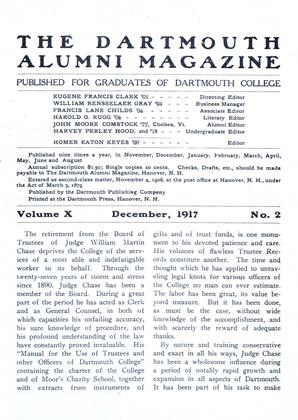By GORDON HALL GEROULD, 99, New York, Charles Scribner's Sons, 1917. Pp. 338.
Owing to a reform wave in New York politics, Mr. Peter Sanders closes the select gambling establishment in his private honse and becomes an exile until such time as the district attorney permits his return. A man of some affluence, sixty, plump, and good-humored; to the public infamous, to his manservant at once hero and babe; a bibliophile and a bachelor, venerating learning and women—such a character must pass, on his way to respectability and righteousness, through situations of delightful irony. Wandering in Europe, he discovers that he is in Monte Carlo; having vowed not to enter the Casino, he yields to the prayers of a needy Pole, goes in and wins for the latter a huge sum. Returning to this country as Paul; Silcox (his own name is too notorious) he becomes the friend of the most upright of all rectors and is fleeced in the simplest way by a youthful financier. Seeking now the simple life he retires to the upper Connecticut valley, where he learns the ways of the New England farmer and incidentally witnesses the "wet-down" and other rites of Dartmouth College. The cynical gambler looks with reverence at the proper education of youth. "By inquiry he even found the modest college library, and he was puzzled, when he entered it, to learn that it was not more richly endowed. The neat card-catalogue revealed the lack of many useful and interesting books that he himself owned. The profound studies that were here pursued must be seriously hindered, he thought, by the want of books" (p. 119). In further wanderings, often in scenes richly humorous, his own simple, genuine personality makes itself felt more and more; he gathers about him a circle of friends who value the ex-gambler for himself. When at length the district-attorney allows his return to New York, he takes up, after various philanthropic deeds, the business of making improved baby-carriages. The erstwhile defrauder of the rich ends by easing the lives of nurslings.
The writer has given us a capital series of character-studies, and of humorous contrasts. Besides the lovable Peter are the stoical and maternal manservant Henry, the austere district attorney "compound of implacable righteousness and bad manners", the ex-Tammany boss, James Garmany, with his evening conversations, and the good rector. The style is clean; being without the striving for effect so common to recent writers, it is effective. Altogether this is a capital piece of work.
The October number of the TrainingSchool Bulletin (Vineland, N. J.) contains "A Laboratory Report on S. W." by C. T. Jones '11.
Charles Downer Hazen '89 is the author of "Alsace-Lorraine under German Rule," which will be reviewed in a later issue. "Liability and Compensation Insurance" by Ralph H. Blanchard 'll will also be reviewed later.
"The Improvement of Ability in the Use of the Formal Operations of Algebra" by Harold O. Rugg '08 and J. R. Clark appears in the School Review for October.
Appleton & Co. have just published "Audubon, the Naturalist," by Professor F. H. Herrick '81. This will be reviewed later.
Herbert W. Rainie '06 is the author of a war song, "Over the Top," which has been set to music by G. H. Perkins of Concord.
"Rookie Rhymes" by the men of the first and second Provisional Training Regiment, Plattsburg, May 15-August 15, 1917, contains, "We're on Our Way to Deutschland" by Lieut. Fletcher Clark '12.
Volume 90 of Reports of Cases argued and determined in the Supreme Court of the State of Vermont is edited and compiled by Sherman R. Moulton '98.
A new edition of "The Collapse of Evolution" by Luther T. Townsend '59 has just been issued.
Professor Charles H. Richardson '92 is the author of "Building Stones and Clays." The book is published by the author and distributed by the Syracuse University Bookstore.
 View Full Issue
View Full Issue
More From This Issue
-
 Article
ArticleCOLLEGE NEWS
December 1917 -
 Article
ArticleOCTOBER MEETING OF THE TRUSTEES—EXTRACTS FROM THE MINUTES
December 1917 -
 Article
ArticleTHE AMERICAN UNIVERSITY UNION IN PARIS
December 1917 By Homer Eaton Keyes, '00 -
 Article
ArticleFROM A TRAINING CAMP IN FRANCE
December 1917 -
 Article
ArticleThe retirement from the Board of Trustees of Judge William Martin
December 1917 -
 Article
ArticleMINUTES OF THE MEETING OF THE COUNCIL OF THE ALUMNI OF DARTMOUTH COLLEGE
December 1917 By HOMER EATON KEYES
Books
-
 Books
Books"Results of Supplementing the Dietary of Substandard Workers with Cod Liver Oil and Milk"
October 1932 -
 Books
BooksSHELLEY'S MAJOR POETRY
October 1948 By ALLAN MACDONALD. -
 Books
BooksMEET DOCTOR DOLITTLE.
JANUARY 1968 By ELNA KUHLMANN -
 Books
BooksBriefly Noted
APRIL 1969 By J.H. -
 Books
BooksVASSI AND FIDELES IN THE CAROLING
August 1945 By John R. Williams '19 -
 Books
BooksPLATICAS Y TEMAS SOBRE LA AMERICA ESP AN OLA
May 1952 By R. A. Casas


